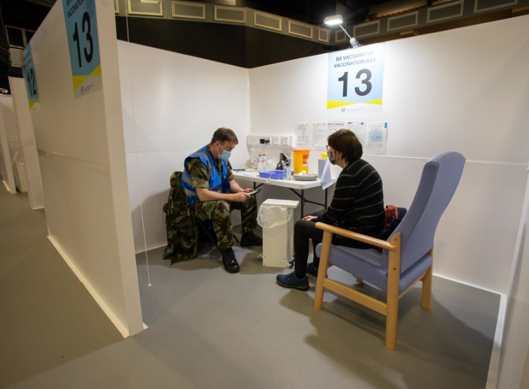COVID-19 Vaccination info for DF pers

Information has been gathered from the HSE website and guidance from DMB. This page will be updated should there be any changes to timelines or Government guidance.
If there is any information or further clarification required please contact your Barrack MO or see the HSE website.
As a Defence Forces personnel when will I get my vaccination?
Apart from vaccinations for operational reasons (COVID facing duties, Overseas and naval ships) all remaining DF personnel will receive their COVID-19 vaccine through the Government Vaccination Program.
Do we have a timeline of when people will get vaccinated?
The Government have advised that every adult in the state would be vaccinated by the end of September.
How will the vaccination confirmation be communicated to each individual?
Direct contact between HSE and individual. This system is already rolled out and people are able to register on the HSE website when their age becomes eligible.
How do I book in to get vaccinated?
Through the HSE website.
Should I apply to get my vaccine through the HSE when it becomes available to my age?
Yes.
There has been talk in the private sector employees getting a day off after the vaccine to recover from any vaccination symptoms, Will DF pers be given 24/48 ED after getting the vaccine?
No routine ED/LD post vaccine is recommended. Personnel who develop side effects should report them to their BKS MO and will be looked at on case-by-case basis.
What does it mean to be "Vaccinated" against COVID-19?
This is when you have received the full dosage of the COVID-19 vaccine and the vaccine has had time to work.
Why should you get your COVID-19 Vaccine?
COVID-19 vaccines offer protection from COVID-19. COVID-19 is a highly infectious disease that can cause serious illness, hospitalisation and even death. If you do get COVID-19 after vaccination, you should be protected from the serious illness the virus can sometimes cause. It is up to you to decide to get your COVID-19 vaccine. But the HSE, the World Health Organization and the Department of Health strongly recommend that you do as soon as it is offered to you.
How long does it take for the vaccine to work? This depends on which vaccine you have been given
- 7 days after your 2nd Pfizer-BioNTech dose.
- 14 days after your 2nd Moderna dose.
- 14 days after the Janssen vaccine (single dose).
- 28 days after your 1st Astra Zeneca dose - you still need to get your 2nd does to make sure that your vaccine protection lasts.
Which COVID-19 vaccine will you get?
You do not get to choose which vaccine you get. The type of vaccine offered to you will be based on supply. All the vaccines we use are safe and effective. The best vaccine to get is the one you are offered.
I have been vaccinated, what changes for me day to day?
There is no one simple answer to cover all here. The HSE have created the “vaccine bonus” which updates regularly. For the latest information click here.
I have already tested positive for COVID-19, do I still need to get vaccinated?
If you have already had COVID-19, you still need to get vaccinated. This is because you could become infected with the virus again. There's a small chance you might still get COVID-19 even if you have been vaccinated. But you'll be protected from the serious illness the virus can sometimes cause.
When should you not get your COVID-19 vaccine?
Do not get your COVID-19 vaccine if you:
- have had a severe allergic reaction to a previous dose of the vaccine.
- currently have COVID-19 – wait until it has been 4 weeks since you first tested positive.
- have symptoms of COVID-19 – self-isolate (stay in your room)and phone your GP to get tested.
- have a fever (temperature of 38 degrees Celsius or above) – wait until you feel better.
- are restricting your movements- wait until you have completed your period of restricted movements to get your vaccine.
COVID-19 Vaccines and pregnancy
Talk to your obstetrician, midwife, GP of BMO about getting your COVID-19 vaccine if you are pregnant. It’s recommended you get your COVID-19 vaccine when it’s offered to you. Being vaccinated will reduce the chance of you becoming very unwell.
Once I am vaccinated do I still have to adhere to the COVID-19 guidelines?
Yes, even if you are vaccinated, continue to follow advise on how to stop the spread of COVID-19 in public by social distancing, wearing a face covering and washing your hands properly and often.
How does the COVID-19 Vaccine work?
Vaccines prepare your immune system (your body's natural defences) to recognise and defend itself against a specific virus.
Some types of vaccine contain a live virus. For example, the flu vaccine contains a small amount of the flu virus. But none of the COVID-19 vaccines in use have the COVID-19 virus in them. They work differently.
There are currently 2 types of COVID-19 vaccine in use:
- mRNA
- viral vector
All vaccines are tested for safety and effectiveness before they can be used. The HSE only uses a vaccine if it meets the required standards of safety and effectiveness.
mRNA vaccines
The Pfizer/BioNTech and Moderna COVID-19 vaccines are both mRNA vaccines.
mRNA vaccines teach your body how to make a protein that will trigger an immune response, without using a live virus. After you get an mRNA vaccine, your body makes antibodies that help fight the infection if a virus enters your body in the future.
Researchers have been studying and working with mRNA vaccines for decades.
How COVID-19 mRNA vaccines work
The surface of the virus that causes COVID-19 is studded with proteins known as "spike proteins". The virus uses these spikes to enter human cells, infecting you with COVID-19.
mRNA COVID-19 vaccines contain the instructions for making this spike protein.
After you get your vaccine, your immune system recognises that the protein doesn't belong there. Your body then begins building an immune response to fight off what it thinks is an infection. This immune response makes antibodies.
The antibodies offer you protection from COVID-19. It is much safer for your immune system to learn how to protect you from COVID-19 through vaccination than by catching the virus.
Your cells then break down the instructions for making the spike protein and gets rid of them from your body.
Viral vector vaccines
The AstraZeneca COVID-19 vaccine is a viral vector vaccine.
Viral vector vaccines use a harmless virus as a delivery system. They teach your body how to make a protein that will trigger an immune response.
Hundreds of scientific studies of viral vector vaccines have been done and published around the world. Some vaccines recently used for Ebola outbreaks have used viral vector technology.
How COVID-19 viral vector vaccines work
Viral vector vaccines are like messengers. They use a weakened version of a different virus (the vector) to deliver instructions to cells in your body.
COVID-19 vaccines use the adenovirus as the vector. Adenovirus is the virus that causes the common cold.
When you get a viral vector vaccine, the vector (adenovirus) enters a cell in your body. It then teaches the cell how to produce the COVID-19 spike protein (as mentioned above).
After you get your vaccine, your immune system recognises that the protein doesn't belong there. Your body then begins building an immune response to fight off what it thinks is an infection. This immune response makes antibodies.
The antibodies offer you protection from COVID-19. It is much safer for your immune system to learn how to protect you from COVID-19 through vaccination than by catching the virus.
